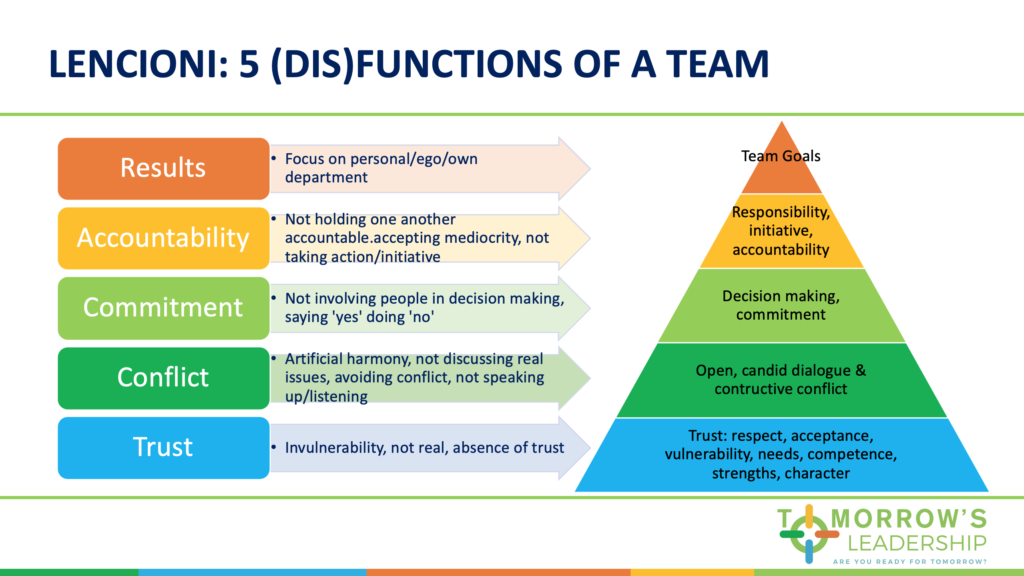Interpersonal Struggles? Learn from Married at First Sight!
Jan Hendrik calls it brains-off programs. Broadcasts on tv that do not require a lot of focus and are easy to digest. Although you might label ‘Married at First Sight’ as a brains-off program, it is brains on for sure! Why?
In Married at First Sight (2020 Australia version) singles are matched based on science (e.g. biology, psychology). The matches with a high success score marry without even knowing each other. They meet for the first time at their wedding day.
During their journey from marriage to building a relationship a lot happens where we can learn from. We especially focus on the learnings related to developing interpersonal relationships. We link our examples to the 5 disfunctions of teams determined by Lencioni.

Building trust
Building trust is the fundament of interpersonal relationships as shown in Lencioni’s pyramid. That’s why the new married couples had a ‘vulnerability week’ after they returned from their honeymoon.
The intend of the vulnerability week was to get to know each other and break down walls. Tearing down walls is only possible if the individuals dare to show their vulnerability. A great example was Stacey. She told Michael that she had issues to open up to a man since she lost her dad already on a young age and also her brother died in an accident. She was afraid to lose again a man she loved. That’s why she acted like an ice queen. By sharing this, Michael understood why she did this and subsequently they developed a strong bond.
We often let people share life lines during team development journeys. This can be an intense exercise, but it helps to understand how people are shaped by the past and why they now behave in a certain way. Since they share their personal life they show their vulnerability as well. Sharing life lines typically benefits the trust in a team.
Ofcourse you need to be willing to get to know each other. Hayley had a drug-addiction in the past. David immediately judged Hayley based on that and was not even willing to get to know her. We see this happening in organizations as well. Often the performance of people is still judged by the past. This is ok if this is about the past couple of months. But people develop and change. So it is not fair to judge people by something that happened years ago. Judge people by their actual behavior!
Conflict
You can imagine that the couples who did not even know each other before they got married, had some conflicts during their first weeks together. Some couples coped really well with different opinions and others not.
Josh and Cathy both had a different style regarding conflicts. For this couple the demand-withdrawal pattern applied. Josh had a demand preference. He wanted to resolve conflicts immediately. Cathy did not. Cathy had a withdrawal preference. She felt attacked when having conflict and built walls to protect herself. She tried to avoid discussing issues at all cost.
In a work environment you will see differences in preferences as well. If you recognize the demand-withdrawal pattern then this is how to deal with it: you simply need to discuss issues. You can’t avoid discussing them. What you can do when one feels overwhelmed is to take a time-out; take some time to reflect on what happened and then when emotions are in control again have the constructive conversation about what you struggle with and what you need.
Hayley and David had a lot of conflicts and they both wanted to win. If you both aim to win you will end up with only losers. It is beneficial to your relationship to go for a compromise now and then.
Also good to memorize is your role in the conflict. There were moment when parents of the newly weds took a role in conflicts that were actually conflicts between the newly weds only. Josh’ mom attacked Cathy since she ignored Josh when they had a conflict. And Connie’s mom tried to convince Connie to go home with her when she had a conflict with her husband. It is logical that you want to protect your child as a parent, but you are not part of the conflict. The only thing you can do is ask questions about the conflict to enable the conflict-owners to resolve their conflict.
Commitment & Accountability
Hayley and David were blaming each other for the conflicts they had. This is obviously not beneficial to the relationship. There are at least two participants in a conflict and they are both accountable to come to a resolution.
These are just some examples of what you can learn from Married at First Sight if you put your ‘interpersonal relations’ glasses on. Suddenly Jan Hendrik also saw the series as a brains on instead of a brains-off program!
Wanna learn more about interpersonal relations? Then our free e-book might be interesting to you!
